从一次开发漏洞看shiro的正确使用
事情的起因是帮班级开发了一个管理平台,其中的权限校验部分使用了shiro。上线后有一个同学发现了一个漏洞,可以造成任意用户登录,绕过Api的身份验证。
我们在使用shiro进行身份认证时,需要根据自己的需求实现Realm,实现doGetAuthentication(用户身份认证信息)以及doGetAuthorizationInfo(用于权限校验信息)。
问题代码
重写的doGetAuthenticationInfo方法,在使用userMapper查询到用户信息之后,将user存到了shiro的session之后。
@Override
protected AuthenticationInfo doGetAuthenticationInfo(AuthenticationToken token) throws AuthenticationException,NumberFormatException {
if (token.getPrincipal()==null){
throw new UnknownAccountException();
}
Integer studentId = Integer.valueOf((String) token.getPrincipal());
//取出数据库中的指定User
User user= Optional.ofNullable(userMapper.selectByStudentId(studentId)).orElseThrow(UnknownAccountException::new);
SimpleAuthenticationInfo info=new SimpleAuthenticationInfo(user,user.getPassword(),getName());
Session session= SecurityUtils.getSubject().getSession();
//存到shiro的session中(对于Web来说本质是HttpSession)
session.setAttribute("USER_SESSION",user);
return info;
}
登录处:
Subject subject=SecurityUtils.getSubject();
UsernamePasswordToken token=new UsernamePasswordToken(studentId,password);
try {
subject.login(token);
}
之后的API处的身份验证:
if(!SecurityUtils.getSubject().isAuthenticated()) {
return resultJson.error(401,"未授权");
}
User user = CommonUtil.getUserFromShiroSession();
//其中的getUserFromShiroSession():
public static User getUserFromShiroSession(){
return (User)SecurityUtils.getSubject().getSession().getAttribute("USER_SESSION");
}
身份认证的逻辑就是:
身份验证时,先验证当前的Subject是否已经授权,如果已经授权的话,获取当前用户采用了从shiro的session中获取的方法
这会导致什么问题呢?先了解一下shiro身份认证的过程
Shiro进行身份认证的过程
我们先Debug跟一下,理一下shiro的身份验证的逻辑。
断点下在login处,我们跟进login方法。
login默认调用的是DelegatingSubject的login方法。

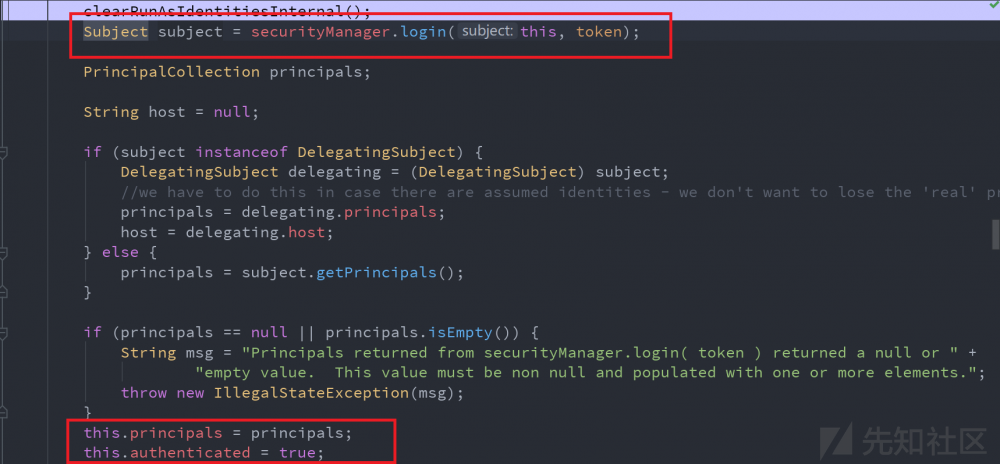
可以看到,其中的逻辑为:调用securityManger的login方法。而其中的改变Subject的成员变量authenticated的值在login的下面。
跟进securityManger的login方法:
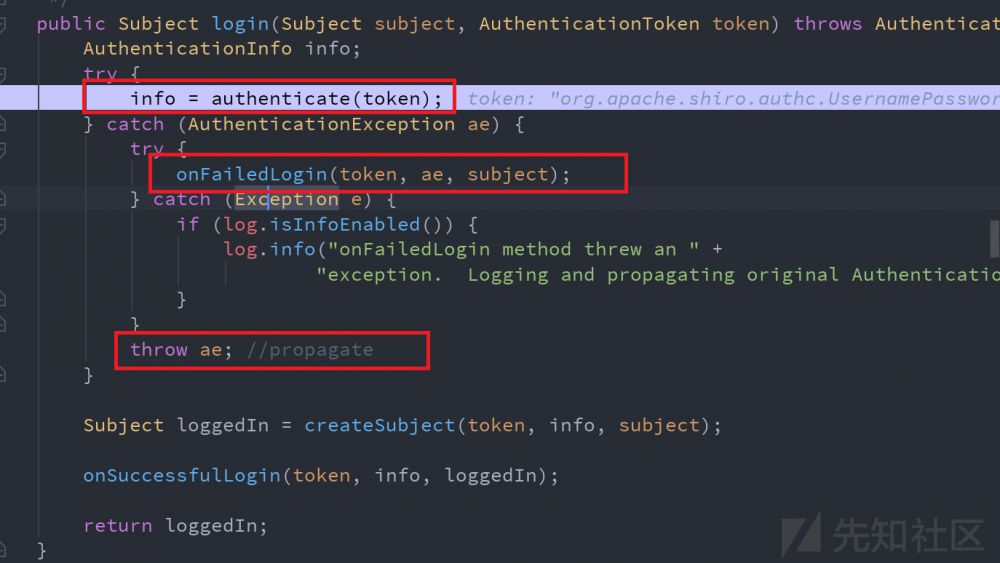
跟进authenticate(token);我们进入authenticate方法,单步往下跟最后可以跟到AuthenticatingRealm的 getAuthenticationInfo 方法。可以看到此处调用了我们重写的 doGetAuthenticationInfo 方法,也就是在这里,依照我们的校验逻辑,shiro中的session就被赋值完成了。


接着我们回到 getAuthenticationInfo 方法,其中调用了 assertCredentialsMatch(token,info) ,将用户输入token,与查出的用户info信息比对,不匹配就抛出异常,异常延调用栈一直抛到我们的subject.login()方法。
这里就可以看出,即使登录失败,我们在 doGetAuthenticationInfo 中设置的session属性依然可以生效。而且由于异常栈抛出的过程中并没有创建subject,也不会重新设置authenticated的状态。
问题根源
当用户重复登录的时候,会改变session中的USER_SESSION的值,但是并不会改变用户isAuthenticated的状态
当A用户使用自己的账号登录成功之后(这时Subject.isAuthenticated()已经变成了true),带着登录成功的Session,尝试登录另一个用户B的账号,Shiro在 Subject.login() 的时候调用了我们重写的 doGetAuthenticationInfo(AuthenticationToken token) 方法。
这时候,Session中的USER_SESSION的值已经变成了用户B的信息,而且shiro这时并不会更新isAuthenticated的状态,这样一来用户A就可以绕开了身份验证,能够以用户B的身份访问其他的API。
拓展
其实当时的写法参考了这篇文章:
一起来学SpringBoot | 第二十六篇:轻松搞定安全框架(Shiro) ,
这篇文章的写法也出了问题,出问题的地方在权限校验处。
Realm:
@Configuration
public class AuthRealm extends AuthorizingRealm {
@Override
protected AuthenticationInfo doGetAuthenticationInfo(AuthenticationToken token)
throws AuthenticationException {
String principal = (String) token.getPrincipal();
User user = Optional.ofNullable(DBCache.USERS_CACHE.get(principal)).orElseThrow(UnknownAccountException::new);
if (!user.isLocked()) {
throw new LockedAccountException();
}
SimpleAuthenticationInfo authenticationInfo = new SimpleAuthenticationInfo(principal, user.getPassword(), getName());
Session session = SecurityUtils.getSubject().getSession();
//在进行权限校验的时候,直接从session中取对应的值
session.setAttribute("USER_SESSION", user);
return authenticationInfo;
}
@Override
protected AuthorizationInfo doGetAuthorizationInfo(PrincipalCollection principal) {
Session session = SecurityUtils.getSubject().getSession();
//这里将user存到了USER_SESSION中
User user = (User) session.getAttribute("USER_SESSION");
SimpleAuthorizationInfo info = new SimpleAuthorizationInfo();
Set<String> roles = new HashSet<>();
roles.add(user.getRoleName());
info.setRoles(roles);
final Map<String, Collection<String>> permissionsCache = DBCache.PERMISSIONS_CACHE;
final Collection<String> permissions = permissionsCache.get(user.getRoleName());
info.addStringPermissions(permissions);
return info;
}
}
我们就用这篇文章的代码做一个demo测试一下,Realm与文章中的相同:
我们创建两个用户:

我们编写以下Controller
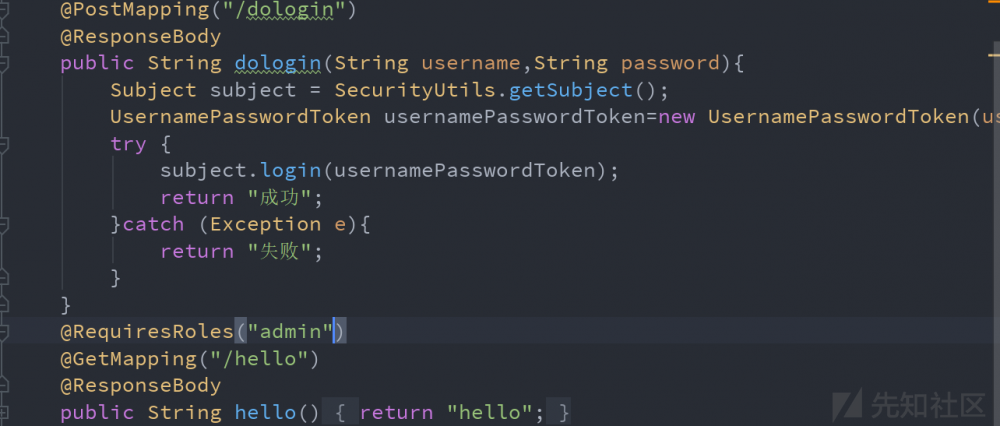
假设我们现在是user2,角色是guest,hello接口只有admin角色的用户可以访问,我们访问不了hello接口。
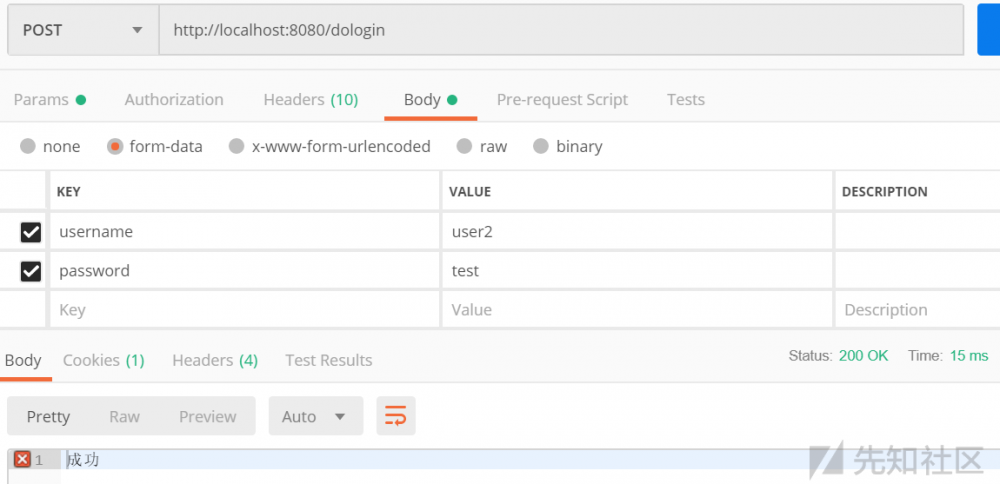
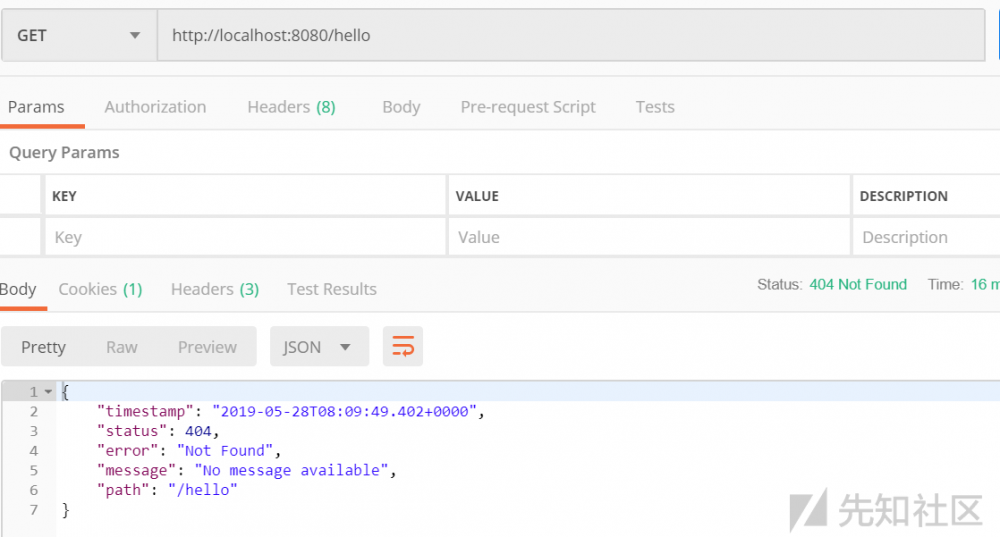
接着我们登录user1,由于我们不知道user1的密码,所以登录失败。
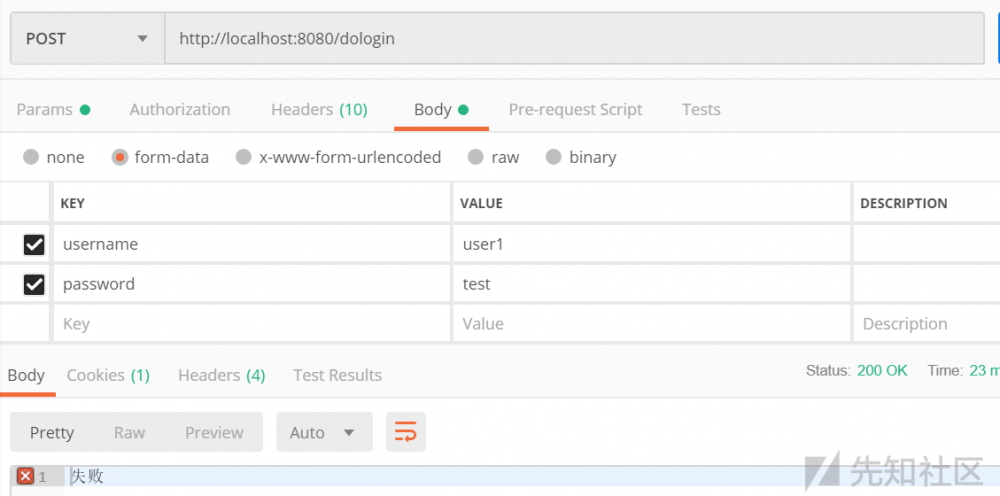
但是此时我们的USER_SESSION已经更新成user1的,所以我们的角色也变成了admin。当调用
doGetAuthorizationInfo 获取info 的时候,获取到的info中的role就为admin。此时我们再次访问/hello
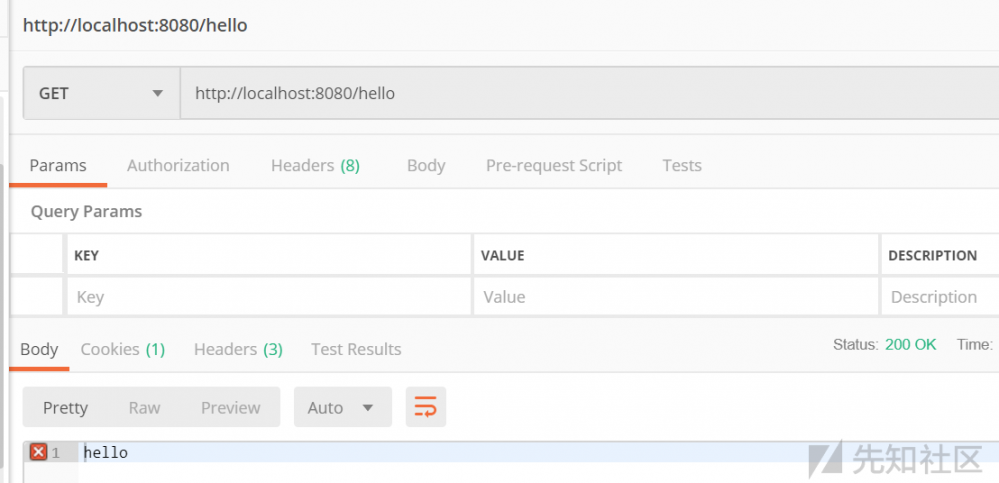
正确使用shiro
从前面的分析可知,在shiro中获取当前用户信息,不要使用自定义的Realm中将信息存到session里。
shiro中正确获取当前用户的方法应该为 (User) SecurityUtils.getSubject().getPrincipal() 来获取,这里是因为Subject中的principal只有在用户成功登录之后才进行更新。
- 本文标签: IDE value 测试 ORM 本质 cat 代码 http ip Collection 数据 json web Security bug 数据库 API src db IO HashSet UI Select spring Authorization springboot 管理 final authenticate cache session map App rmi 文章 id js 漏洞 开发 认证 mapper token 安全 需求 Word https MQ
- 版权声明: 本文为互联网转载文章,出处已在文章中说明(部分除外)。如果侵权,请联系本站长删除,谢谢。
- 本文海报: 生成海报一 生成海报二











![[HBLOG]公众号](https://www.liuhaihua.cn/img/qrcode_gzh.jpg)

